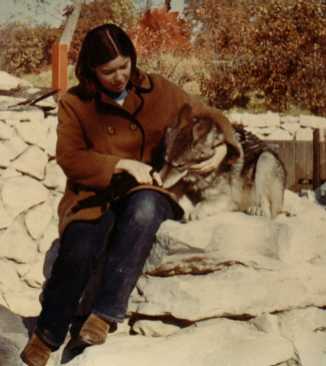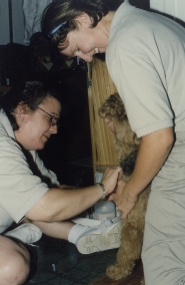| WYSIWYG Welsh Terriers Our Contribution To Science |
WOLF PROJECT (2000)
The Saint Louis Zoo's Research Department has been
working to develop a reliable method of freezing Mexican
wolf semen, as part of the U.S. Fish and Wildlife Service
Recovery Program for that species. Canid sperm, in
general, present a problem, in that they seem not to
survive freezing and thawing as well as do the sperm
from species such as cattle or even humans. A further
problem with wolves is that they have a very short
breeding season, which results in males producing
good quality semen for only about one month per year.
As you can imagine, that severely limits our
opportunities to test semen handling and preservation
techniques.
To help address that problem, we are hoping to use
semen from domestic dogs (that produce sperm year
round) to perform some basic experiments that will help
us narrow down the variables we will need to test with
Mexican wolf semen in the upcoming breeding season
(starting late January/early February). Our focus this
season is on standardizing protocols for cooling the
sperm before it is frozen. The experiments will separate
each semen sample into several fractions and submit
each to a different cooling rate. Than all samples will be
frozen as pellets on dry ice, and later thawed for
evaluation of post-thaw quality. The two protocols that
yield the best results will then be tested on the wolf
samples.
CH, CACH-S (Int CH) Baileywyc's Mawr Anwylyd, CD, SE,
RN, TT, CGC (Moose) received recognition from the
Saint Louis Zoo and The Wild Canid Survival and
Research Center for his contribution to the Mexican Wolf
Species Survival Plan.
Species Survival Plans are coordinated by the
American Association of Zoos and Aquariums (AZA).
The Saint Louis Zoo's Research Department has been
working to develop a reliable method of freezing Mexican
wolf semen, as part of the U.S. Fish and Wildlife Service
Recovery Program for that species. Canid sperm, in
general, present a problem, in that they seem not to
survive freezing and thawing as well as do the sperm
from species such as cattle or even humans. A further
problem with wolves is that they have a very short
breeding season, which results in males producing
good quality semen for only about one month per year.
As you can imagine, that severely limits our
opportunities to test semen handling and preservation
techniques.
To help address that problem, we are hoping to use
semen from domestic dogs (that produce sperm year
round) to perform some basic experiments that will help
us narrow down the variables we will need to test with
Mexican wolf semen in the upcoming breeding season
(starting late January/early February). Our focus this
season is on standardizing protocols for cooling the
sperm before it is frozen. The experiments will separate
each semen sample into several fractions and submit
each to a different cooling rate. Than all samples will be
frozen as pellets on dry ice, and later thawed for
evaluation of post-thaw quality. The two protocols that
yield the best results will then be tested on the wolf
samples.
CH, CACH-S (Int CH) Baileywyc's Mawr Anwylyd, CD, SE,
RN, TT, CGC (Moose) received recognition from the
Saint Louis Zoo and The Wild Canid Survival and
Research Center for his contribution to the Mexican Wolf
Species Survival Plan.
Species Survival Plans are coordinated by the
American Association of Zoos and Aquariums (AZA).
PROLACTIN PROJECT (2001-2002)
The Saint Louis Zoo's Research Department is investigating the role of
parental care in canid species such as fennec fox, bush dog, Mexican
grey wolf. A part of this research involves the development of a hormone
assay to detect prolactin levels in canids. Serum samples are needed to
validate our assay, to be sure it is effective in detecting prolactin in the
various canid species and at both high and low levels of prolactin.
Prolactin is a protein hormone secreted by the anterior pituitary gland in
the brain. Although prolactin has many functions, it is most commonly
known because of its effect of promoting lactation in mammals. In
canids, prolactin is present in low levels in adults of both sexes during
the non-breeding season. During pregnancy (or in canids also during
pseudo-pregnancy) prolactin gradually increases until it reaches peak
levels around the time of parturition and remains elevated during
lactation.
We need anestrous (non-breeding season) samples from both males
and females to establish the low values. To establish the high values
we need samples from 1.) females in late gestation or late
pseudopregnancy and/ or during lactation and 2.) from males 1 - 3
months post-mating.
Esty Glen Wybr y Pwll Nofiwr JE RN TT CGC CG and CH, UCICB (Int CH)
Datawelsh Bychan Lleu Lleu TT CGC donated very important samples to
this project - less than 24 hours before whelping and again
eight-fourteen days after whelping.
CH, CACH-S (Int CH) Baileywyc's Mawr Anwylyd CD SE RN TT CGC
donated his blood sample ten weeks post-mating.
The following Baileywyc and Wysiwyg Welsh terriers also donated blood
samples to this project:
Wysiwyg-Baileywyc Clebryn CGC
CH, CACH-B (Int CH) Wysiwyg-Baileywyc Syndod Hogyn RN CGC TT
The Saint Louis Zoo's Research Department is investigating the role of
parental care in canid species such as fennec fox, bush dog, Mexican
grey wolf. A part of this research involves the development of a hormone
assay to detect prolactin levels in canids. Serum samples are needed to
validate our assay, to be sure it is effective in detecting prolactin in the
various canid species and at both high and low levels of prolactin.
Prolactin is a protein hormone secreted by the anterior pituitary gland in
the brain. Although prolactin has many functions, it is most commonly
known because of its effect of promoting lactation in mammals. In
canids, prolactin is present in low levels in adults of both sexes during
the non-breeding season. During pregnancy (or in canids also during
pseudo-pregnancy) prolactin gradually increases until it reaches peak
levels around the time of parturition and remains elevated during
lactation.
We need anestrous (non-breeding season) samples from both males
and females to establish the low values. To establish the high values
we need samples from 1.) females in late gestation or late
pseudopregnancy and/ or during lactation and 2.) from males 1 - 3
months post-mating.
Esty Glen Wybr y Pwll Nofiwr JE RN TT CGC CG and CH, UCICB (Int CH)
Datawelsh Bychan Lleu Lleu TT CGC donated very important samples to
this project - less than 24 hours before whelping and again
eight-fourteen days after whelping.
CH, CACH-S (Int CH) Baileywyc's Mawr Anwylyd CD SE RN TT CGC
donated his blood sample ten weeks post-mating.
The following Baileywyc and Wysiwyg Welsh terriers also donated blood
samples to this project:
Wysiwyg-Baileywyc Clebryn CGC
CH, CACH-B (Int CH) Wysiwyg-Baileywyc Syndod Hogyn RN CGC TT
| Lucy Eldredge, with one of the gray wolves she raised during her career as a zookeeper. |
| July 2002 - Representatives from the Saint Louis Zoo collecting a blood sample from Moose. |

